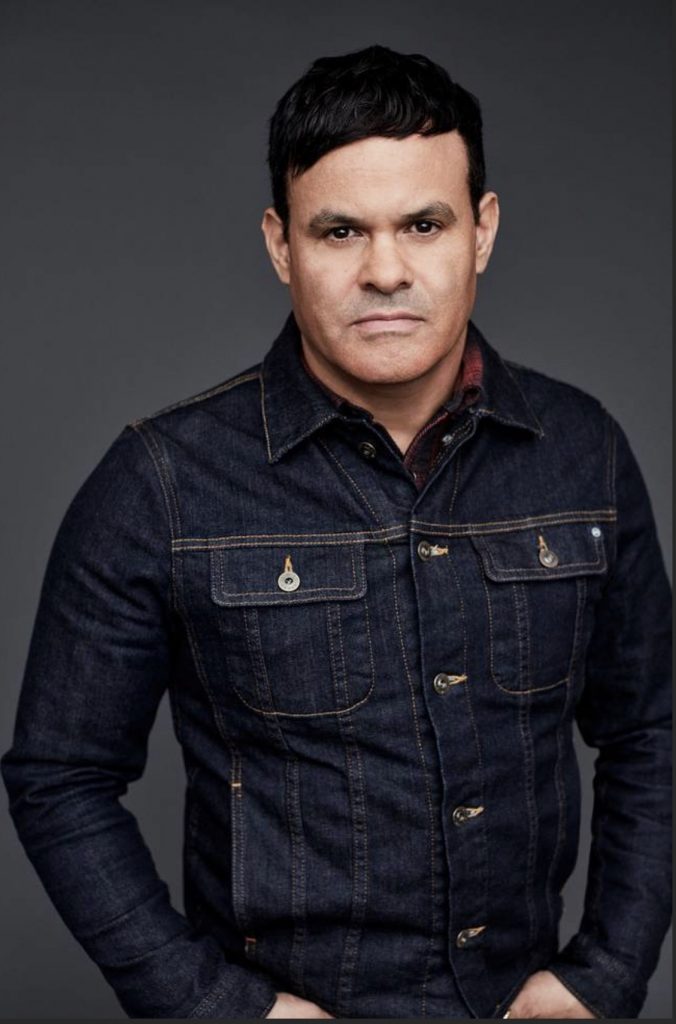You wouldn’t think to pair The Office co-creator Stephen Merchant with Mayans M.C. co-creator Elgin James on a dark comedy series. Yet, together they’ve struck gold with a charming ensemble cast in Amazon Prime’s The Outlaws, and a second season is already on its way.
Continuing his penchant for human stories that play into specific, indelible personalities, Merchant was inspired to create the series after hearing recollections from his parents, who were supervisors of low-level criminals completing community service.
While exploring collaborators on the idea, Merchant’s agents put him in touch with American filmmaker James, whose 2011 film Little Birds premiered at the Sundance Film Festival, and together developed the story to focus on an eclectic group of strangers court-ordered to perform community service in Bristol, England.
The genial humor and vast array of characters, including a con artist played by Christopher Walken and Merchant playing an incompetent lawyer, adds to the affection of the six-hour-long episode series. Additionally, James and Merchant provide the series with a larger-than-life quality by incorporating a musical score inspired by Serge Leone westerns.
“We always thought of the characters like the Magnificent Seven, but kind of a provincial suburban version of that,” explains Merchant. “The idea of them is this unlikely group that harks back to those kinds of westerns like The Dirty Dozen but without the glamor of Steve McQueen. They’re these ordinary people thrust into a situation that for them feels epic… and they don’t quite deserve this level of grandeur.”
Merchant and James spoke with Awards Focus about Merchant’s inspiration for the series, collaborating on the project after being set up on a “blind, first-date,” evolving the show from its setting in Los Angeles to Bristol and balancing political opinions to humanize the characters.

Awards Focus: Stephen, I wanted to start with your personal history with this project and the folks in community service. Were any characters that you found endearing who were dancing with the law?
Stephen Merchant: I never really got to meet them. I would only hear legends told of them from my mom, who worked closely with offenders doing community service. I remember she told me about an old guy who used to come quite regularly through the ranks year after year. He was always stealing vegetables and plants from people’s garden allotments. She realized over time that he liked getting arrested in community service because he liked the social aspect of it.
I’m sure there are easier ways to meet people, like joining a chess club or something, but I remember there was an American businessman who, funny enough, got caught doing a DUI and could have just skipped the country. But he actually didn’t and stayed to do his community service, which I thought was quite noble.
My dad was also involved with it and caught people smoking weed in a cupboard, which we dramatized in the show. One time they had a local dignitary coming to inspect the placement that they’d done, and my parents were very excited. They were trying to get everyone on their best behavior. One of the offenders said the bathroom wasn’t working, so they went to use the bathroom in the pub. Then another person went, and slowly they all went to the pub, and no one was there for the dignitaries. My father was sent to find them, and they were all in the pub drunk [laughs]. So it seemed like a rich, fun backdrop for something, even when I was only hearing it second-hand.
AF: Elgin, I love that you’re not in one lane creatively, which seems to be what Hollywood likes to do these days. Can you talk about how you and Stephen came to work together and whether there was a friendship first?
Elgin James: It started through Steve’s agent, who had seen my film Little Birds. We went on a blind first date… a friendship first date, and we knew right off that we liked the same things. More importantly, we knew we hated the same things and, honestly, we loved the same storytelling. So it became like, why can’t we do this? And, like you said, sort of smash these things together and get out of the boxes at the time that Hollywood tries to put you in. We just crashed into each other’s lanes.
AF: The idea originated as a feature and then you both realized you wanted to reward the ensemble with more material. What changes specifically from LA to the UK came to mind for the characters?
Merchant: Elgin very kindly went out and spent time with some community service people in the city of LA.
James: There are two straws to be drawn: One was to do community service with a bunch of offenders, and the other was to go to Christopher Walken’s estate in Connecticut. I got the short straw and spent the day doing community service. The worst part is they knew I should be with them. Like they could smell the offender on me, but I had to stay and sit with the cops the whole time. It felt so weird, but I remember we learned a lot from that.
Merchant: I remember you coming back and saying that there was a person who was supervising, who was sitting in a lawn chair reading a magazine or Twitter.
James: [Laughs] Cool hand Luke!
Merchant: So we kind of folded that into the show. But, as you say, it felt unwieldy as a film. We just had so many characters, and we couldn’t give them enough time. So it all started to feel quite superficial. Whereas we thought about it as a TV show and could explore and go home with the characters and get to know them more.
But actually, the transition from LA, as it was originally set to the UK, was not as stark as you’d think, funnily, because the form of community service and the reasons you do it are the same. I think the big difference is that guns are an issue. We’ve got a lot of confusion about guns because, in the UK, guns are very rare, even among crime and gang culture. So the idea of where everyone would pull out a gun, between in an American show and one set in the UK, became quite significant because a gun in the UK is huge.
James: That was really interesting as an American. I remember having that conversation once we put it in Bristol, and it was just like, I grew up with guns in my house. I had my first gun at 13 breaking into somebody’s house. It’s such a part of our culture that we don’t even think about it. I remember talking about it in the writer’s room at that time with Stephen over zoom, and it was like, oh wait… I guess that’s weird.
Steve and I had dinner the other night, and we were talking about how many shootings happen in this country all the time that we don’t even read them anymore. We skim past them in our news because we’re so used to them, which is just terrifying.
AF: What was your game plan for getting Christopher Walken for the role of Frank Sheldon?
Merchant: You know, you’re always slightly intimidated when you’re meeting those sorts of people, if only because they’re so iconic, so you just don’t want to put your foot in your mouth and say the wrong thing. I was told ahead of time that Chris is very comfortable with silence, which is a smart way to describe him because he’s a very thoughtful man. He’s very contemplative.
We had a long, quite leisurely, conversation. We ate omelets, and he would ask about the tone of the show and Bristol. He knew someone growing up that the character reminded him of, an acquaintance who would still float into view of his social group and ask if anyone had any money. Honestly, I left there not knowing what his answer was, but when he showed up in Bristol, you know, it clearly worked.
AF: Can you talk a bit about incorporating music into the show, the Sergio Leone type of score, because it works so well as a vivaciousness to the series?
Merchant: We always thought of them something like the Magnificent Seven, but kind of a provincial suburban version of that. The idea of them is this unlikely group that harks back to those kinds of westerns like the dirty dozen without the glamor of Steve McQueen. They’re these ordinary people thrust into a situation that, for them, feels epic. Something about that music gives these small lives an epic quality, and you imagine this group of seven with shotguns walking across a heat-hazed desert plane. But instead, it’s a suburbia of Bristol, and they don’t quite deserve this level of grandeur.
James: It sounded like real emotional stakes, and that’s how everyone felt. I think it really did capture the emotional inside life that all these characters are going through, no matter the situation. Like getting pulled over for a ticket that feels pretty epic.
AF: I found it interesting that you wrote a nuanced, conservative character who’s not just lambasted. You take the far right and far left and make them fully human. Was that decision made early on to get the comedy but also make us care about them?
James: That was actually fun to be able to try to work that out. You’re with one character, and you agree with them, then all of a sudden, you’re with John, and you’re agreeing with him and seeing where they’re both right.
Merchant: It was quite important that we try not to demonize anybody across the board. It felt like everybody has a life story and the decisions they’ve made led them to the place they are in life. But very few people are sort of all good or all bad. When we were doing it, it was Trump, it was Brexit in the UK, politics… everything was very divided, and it felt like you had to pick a side, and you were expected to pick a side. So you picked a side, and then everybody on the other side was somehow wrong about everything.
AF: I’m curious what changes narratively started to be made when you got the green light to do a season two.
Merchant: We’re literally just wrapping post-production now. After the initial lockdown, we came back and did two seasons back-to-back, so it was about 220 days of shooting, which was intense. We always liked the idea of turning the heat up on these characters. Instead of magically disappearing, all the mistakes they’ve made in the first season are still there and keep coming back to haunt them. The fun is seeing the kind of sweatiness of all the choices they’ve made. You don’t have to keep trying to establish who everyone is… you can just enjoy the characters’ dynamics.


